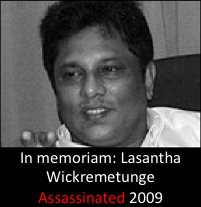
[Editors note: The following text is from a speech at the Platform for Freedom event commemorating Lasantha Wickremetunge’s brutal murder a year ago. The widow of the slain editor, Sonali Samarasinghe Wickrematunge, also sent a strongly worded letter to President Mahinda Rajapaksa on 4th January 2010, which can be read in full here. Both the text of the speech and the letter were sent by Sonali to Groundviews for publication.]
Lasantha was murdered on January 8, 2009 in broad daylight as he drove to work. According to witnesses eight men on four motorcycles surrounded his car and bludgeoned him to death. The brutal killing took place some 200 yards from one of Sri Lanka’s largest Air Force bases.
Now a year later, Lasantha’s murder remains unsolved. Indeed, as with the 13 other dissident media workers brutally slaughtered since President Mahinda Rajapaksa assumed the presidency just four years ago, there has been no serious investigation of his murder. And I am confident there will never be one. When the state kills, it kills with impunity.
The situation of the media in Sri Lanka is precarious and the outlook is grim. Independent journalists practice their profession only with the utmost risk. In 2006 President Rajapaksa suspended the Constitution and promulgated a series of regulations that sought to curb the media. It is under these regulations that Jayaprakash Tissainayagam, a Tamil journalist, was recently given a 20-year sentence of imprisonment with hard labour for writing an article perceived as being critical of the Rajapaksa Administration. These draconian regulations are still in force eight months after Sri Lanka’s armed forces vanquished the Tiger terrorists. They are in force because Mr Rajapaksa has an election to win on the 26th of this month. And nothing—neither life nor limb, neither decency nor democracy—will be spared to wrest that victory from the people of Sri Lanka.
Sadly for our country, I believe the worst is yet to come. It is now open to doubt whether the victory over terrorism, achieved after terrible bloodshed and loss of life, both civilian and military, will turn to ashes as the government subverts democracy so as to consolidate its stranglehold on power. Never in our history have we seen corruption, nepotism and state-sponsored violence practiced so blatantly and on so wide a scale, as we see now. Never before have the fundamental tenets of democracy been tested so severely as they are being tested now.
In the course of this spasm of murder and violence these past four years, dozens of media workers have been forced to flee Sri Lanka and seek refuge elsewhere. The Rajapaksa Government holds the Sri Lankan media in an iron grip. The state media have been reduced to an organ of cheap political propaganda for the president and his brothers, little more than peons singing paeans. But even they sometimes rebel, and the consequences for their staff—as we saw at the Rupavahini television station in 2008—can be terrifying.
My husband was just one of fourteen journalists to have paid the ultimate price for practicing independent journalism since November 2005. Others such as Paranirupasingham Devakumar, the Jaffna correspondent for MTV and Sirasa’s News 1st programme, was brutally hacked to death while driving his motorcycle in Navanthurai.
In 2006, Daily Mirror editor Champika Liyanarachchi was telephoned and threatened by Defence Secretary Gotabhaya Rajapaksa, warned not to expose the misdeeds of former LTTE Eastern Commander Karuna Amman, who now serves as a cabinet minister in government, and holds the title of Vice President of the SLFP.
In 2008, journalist Keith Noyahr was abducted in the cover of darkness as he drove home at night. Only desperate appeals from senior politicians to the powers that be were able to secure his release, and the veteran defence correspondent was forced to flee Sri Lanka shortly thereafter.
Even before Uthayan Editor Nadesapillai Vithyatharan was abducted and later ‘arrested’ by the police last year, on the charge trumped up by the defence secretary of having coordinated LTTE air attacks, several of his journalists had been murdered.
Suresh Kumar, Uthayan’s Marketing Manager, was murdered on World Press Freedom Day in 2006 in a commando-style raid on the newspaper’s Jaffna office. A delivery agent for the paper, Sathasivam Baskaran was shot dead not three months later as he sat in his marked delivery vehicle. Uthayan investigative journalist Selvarajah Rajivarnam was murdered in 2007.
There can be no doubt that the LTTE terrorists with its barbarous past is to blame for their fair share of terrorising and murdering journalists. But for the state to indulge with impunity in the very tactics that made the LTTE such a menace to our country, is unacceptable. It is never acceptable to fight terrorism with terrorism, especially when that war is being waged on your own citizens.
It is indeed remarkable that despite the climate of total impunity for attacks on journalists and their places of work, there still exists that small but indomitable minority of scribes and editors in the ever-diminishing independent media many of whom are gathered here today. You are of an altogether different ilk. You walk with angels. And it is thanks to your determination and extraordinary courage that Sri Lanka today retains even a vestige of journalistic and democratic integrity. So long as you persist—and are allowed to live—there is hope.
Our duty today then, is to extend to this minority of brave people all the support we can muster. We must speak out for freedom. If we fail in this duty now Lasantha, and all those who have paid the supreme price for the liberty that we ourselves enjoy, will have died in vain. History judges harshly, and future generations must not point to us and say it was we who failed them. We must not fail.
